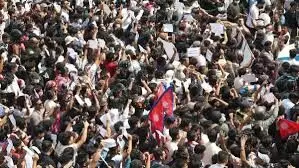Nepal Considers Reversing Social Media Ban After 18 Killed in Gen Z-Led Protests
At least 18 people were killed in Nepal after Gen Z-led protests erupted over the government’s social media ban. PM Oli defends move as “national dignity,” but cabinet may reconsider.
Demonstrators protest outside Nepal’s Parliament in Kathmandu on September 8, 2025, demanding an end to the social media ban and government corruption.

After 18 people were killed and almost 90 injured during violent protests against the government's social media ban, Nepal is experiencing its deadliest wave of protests in recent memory. Prime Minister KP Sharma Oli's administration has been forced to consider lifting the contentious restrictions due to the unrest, which is mostly being driven by Gen Z activists.
On Monday, thousands of young people demonstrated in Kathmandu's streets, calling on the government to remove its ban on well-known websites like Facebook, Instagram, and YouTube. Additionally, protesters chanted anti-corruption and anti-political elitism slogans, accusing leaders of disregarding the hardships of common Nepalis.
Hospitals reported dozens of critical injuries, and state television confirmed the deaths. After being wounded during fighting in New Baneshwor, one protester passed away at Civil Hospital.
Across Nepal, Violent Clashes
Demonstrators attempted to storm a municipal office in Damak and set fire to an effigy of Prime Minister Oli. To disperse crowds, police used tear gas, rubber bullets, and water cannons, which resulted in more casualties and property damage. According to local media, protesters were throwing tear gas canisters back at security forces, and motorcycles were being set on fire.
The Government Indicates a Potential U-Turn
The cabinet will examine the ban, government spokesperson Prithvi Subba Gurung informed the media. "What matters most are the lives of our people. "There is no point in being stubborn if the government's policies need to be reconsidered," he said.
The ban was implemented last week in response to allegations that social media companies had not registered with Nepal's Ministry of Communication and Information Technology by the deadline.
PM Oli argues that the ban is a "matter of dignity."
Prime Minister Oli defended the decision during a public event, stating that it was a matter of "national self-respect." He charged multinational tech firms with disregarding Nepali law, which includes tax duties and the need to designate local grievance officers.
Oli stated, "We oppose conceit and disdain for our nation, not social media platforms." "Some sacrifices may be required for national dignity."
Expanded Internet Restrictions
Due to worries about fraud and money laundering, Nepal has previously blocked apps like Telegram. Last year, TikTok's nine-month ban was lifted after the platform consented to follow local laws.
However, it seems that the most recent protests are about more than just internet access. Videos that contrast the affluent lifestyles of politicians' children with the struggles of working-class Nepalis have gone viral on TikTok, infuriating young people.
The upcoming cabinet meeting, where the Oli government will decide whether to stick to the ban or give in to growing public pressure, is the focus of attention as tensions rise.

